![]()
Woensdag, 15 December 2010 | Cablegate | Bewerkt door Crethi Plethi
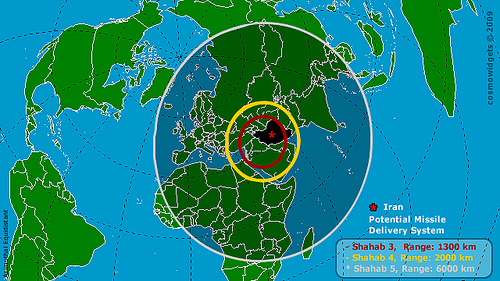
Het bereik van de verschillende types Shahab-raketten (gebaseerd op Noord-Koreaanse technologie). (flickr.com/cosmowidgets)
WikiLeaks: Noord-Korea en China Leverden Raketonderdelen Aan Iran
Condoleezza Rice, de toenmalige Amerikaanse minister van buitenlandse zaken, instrueert in dit document van 3 november 2007 de Amerikaanse ambassadeur in China om “tot op het hoogste niveau” aan te dringen op het stoppen van een levering van ballistische raketonderdelen uit Noord-Korea aan Iran via Beijing. In het document beklaagd de VS zich over nog eens 10 van dergelijke zendingen die in het verleden ongehinderd via China aan Iran geleverd werden.
Daarnaast beschuldigde de VS in een later document Chinese bedrijven van het leveren van een grondstof voor chemische wapens aan Iran en hulp bij de exploitatie van een nieuwe chemische fabriek in Iran [mei 2009].
Volgens het document uit 2007 zou er een Noord-Koreaanse lading met raketvinnen, bestemd voor de Iraanse Shahid Bagheri Industrial Group verantwoordelijk voor het Iraans brandstofprogramma voor ballistische raketten, de volgende dag via een geplande commerciële Iran Air vlucht van Beijing naar Iran gevlogen worden.
In wat de VS “dringende actie vereist” noemt, gaf Rice de Amerikaanse ambassadeur de opdracht om “bij de eerste gelegenheid” en “op het hoogste niveau” de Chinese autoriteiten ervan te overtuigen om de levering tegen te houden. Rice zei tegen de ambassadeur dat hij de Chinezen eraan moest herinneren dat George Bush deze kwestie persoonlijk had besproken met de Chinese president Hu Jintao tijdens de APEC summit in Sydney [Australië].
“Buitenlandse Zaken wil zowel onmiddellijke actie … als een strategische aanpak met betrekking tot deze cruciale kwestie,” zegt het document. “We hebben nu informatie dat de goederen worden verzonden op 4 november en dringen aan op een inhoudelijke reactie uit China … Wij vinden dat maatregelen door de Chinese autoriteiten de beste manier is om deze zendingen in de toekomst te voorkomen.”
Daarnaast wilde Washington dat de ambassadeur de volgende punten aan zou snijden:
— Informatie vragen over de stappen die China gezet heeft sinds de ontmoeting tussen president Bush en president Hu Jintao.
— Benadrukken dat de geloofwaardigheid van de VN Veiligheidsraad gehandhaafd moet blijven door te voldoen aan de VN Resoluties 1718, 1737 en 1747.
— Benadrukken dat de VS verwachten dat Noord-Korea en Iran door zullen gaan met het uitwisselen van kennis en onderdelen omtrent rakettechnologie.
— De noodzaak benadrukken van het regelmatig controleren van vracht op commerciële vluchten van Noord-Korea via Beijing naar Iran om leveranties te kunnen onderscheppen.
— Benadrukken dat de VS willen samenwerken met China, dat alle informatie nauwkeurig gecontroleerd wordt alvorens het aan de Chinezen doorgegeven wordt en dat de VS bereidt zijn dit te blijven doen zodat de VN Resoluties gehandhaafd kunnen worden.
Washington maakte zich zorgen over de Iraanse korte- en middellangeafstandsraketten vanwege het vermoeden dat de raketten uitgerust zouden kunnen worden met een kernkop als Iran nucleaire capaciteiten zou ontwikkelen.
Het Iraanse raketprogramma maakt veel vooruitgang. In mei vorig jaar werd met succes de Sejil-2 twee-traps [vaste brandstof] raket getest in Iran. Met een bereik van maximaal 2,500 km is deze raket in staat om Israël, de Arabische landen en delen van Europa te bereiken. Zowel de Sejil en de Shahab-3 [vloeibare brandstof] raket, afkomstig van een Noord-Koreaans ontwerp, zijn theoretisch uit te rusten met een nucleaire lading.
Hoewel Noord-Korea zich blijft verzetten tegen internationale anti-proliferatie-inspanningen heeft de VS druk uitgeoefend op China om de raketten-gerelateerde samenwerking met Iran, dat dateert uit de jaren ’80, aan banden te leggen. Het document verwijst specifiek naar Iraanse pogingen om wolfraam-koper-legeringsplaten van de Chinese Dalian Sunny Industries te verkrijgen.
In een andere document, gestuurd door minister van Buitenlandse Zaken Hillary Clinton in mei [205348], zei de VS dat het bezorgd was dat de uitvoer door de genoemde Chinese bedrijven “kunnen worden gebruikt voor een CW [chemische wapens] programma.” Clinton vraagt zich af of de verdachte leveringen zijn goedgekeurd door de Chinese regering en waarschuwt dat er sancties kunnen worden opgelegd.
“We verzoeken de Chinese regering alle nodige maatregelen te nemen om deze kwestie te onderzoeken en te voorkomen dat Iran goederen voor tweeërlei gebruik en apparatuur en technologie kan verwerven die gebruikt kan worden in haar CW programma.”
Volgens een analyse van de Arms Control Today heeft de Amerikaanse druk op Beijing gemengde resultaten gehad. “In november 2000 beloofde China dat het geen enkel land op enigerlei wijze zou helpen ‘met de ontwikkeling van ballistische raketten die gebruikt kunnen worden om kernwapens te maken’ … Toch is het Amerikaanse ministerie van Buitenlandse Zaken van oordeel dat de Chinese bedrijven nog steeds het ballistische raketprogramma van Iran ondersteunen,” volgens Arms Control Today.
Het Amerikaanse document bevat ook een zogenaamde non-paper – een onofficiële, niet-bindend bericht – voor de Chinezen. Met nauwelijks verholen Amerikaanse frustratie maakt het non-paper gewag van het feit dat deze leveranties al meerdere malen en op meerdere momenten besproken zijn met Chinese functionarissen echter zonder resultaat. In het non-paper wordt melding gemaakt van minstens 10 gevallen van Noord-Koreaanse raketonderdelen transporten die ongehinderd aan Iran doorgegeven werden door Beijing.
“Wij geloven dat geplande commerciële passagiersvluchten regelmatig gebruikt zullen blijven worden voor deze leveringen … Wij verzoeken u dringend om dergelijke zendingen te voorkomen via de actie u geschikt acht,” zegt het document.
Bron: WikiLeaks
Saturday, 03 November 2007, 05:03
S E C R E T STATE 152317
EO 12958 DECL: 10/31/2027
TAGS PARM, PREL
SUBJECT: POST REQUESTED TO FOLLOW UP ON ONGOING MATTERS OF
PROLIFERATION CONCERN RAISED AT APEC BY PRESIDENT BUSH
REF: (A)STATE 071143, (B)STATE 073601, (C)STATE 72896, (D)BEIJING 5361, (E) STATE 148514
CLASSIFIED BY EAP DAS THOMAS J. CHRISTENSEN: 1.4 (B) AND (D).1. (S) URGENT ACTION REQUEST: IN SEPTEMBER DURING THEIR MEETING AT THE APEC SUMMIT IN SYDNEY AUSTRALIA, PRESIDENT BUSH DISCUSSED WITH CHINESE PRESIDENT HU STRONG CONCERNS RELATING TO THE ONGOING TRANSSHIPMENT VIA BEIJING OF KEY BALLISTIC MISSILE PARTS FROM NORTH KOREA TO IRAN’S MISSILE PROGRAM. PRESIDENT BUSH PLEDGED TO RESPOND TO PRESIDENT HU’S REQUESTS FOR FURTHER INFORMATION. EMBASSY SHOULD ON NOVEMBER 3 AT THE MOST EFFECTIVE LEVEL POSSIBLE, DELIVER THE NON-PAPER IN PARA 8 WHICH RELATES TO SPECIFIC, TIME- SENSITIVE INFORMATION ABOUT AN IMMINENT TRANSSHIPMENT. IN ADDITION, AT THE EARLIEST OPPORTUNITY POST SHOULD DELIVER THE NON-PAPER IN PARA 9 TO MFA AT THE HIGHEST LEVEL POSSIBLE, PREFERABLY BY THE AMBASSADOR SINCE THIS IS IN RESPONSE TO PRESIDENTIAL-LEVEL DISCUSSIONS.
———-
OBJECTIVES
———-
2. (S/REL CHINA) Post should:
–(This point for November 3 Delivery) Request China to stop an imminent shipment to Iran’s ballistic missile program. This is the same cargo that the Ambassador shared about on October 25 (ref E). It is now scheduled to leave Beijing airport on November 4.
–(This point for November 3 Delivery) Note the importance of this demarche since it relates to a topic discussed by Presidents Bush and Hu in Sydney. Embassy should further note that the Embassy will be seeking an appointment at the highest level possible to convey a more extensive presentation on this topic of ballistic missile parts from North Korea to Iran.
–Remind Chinese officials that President Bush has been personally engaged on the issue of the transshipment of ballistic missile parts between North Korea and Iran via Beijing and that he raised this issue with President Hu at the APEC Summit.
— Seek information on the steps China has taken since the APEC discussion to address this issue and impress on them the necessity for China to take immediate strong action.
— Stress that the credibility of UN Security Council actions must be maintained by vigorous implementation by UN Member States of UNSC resolutions calling for Chapter VII sanctions, particularly 1718, 1737, and 1747.
–Indicate that the U.S. believes that the proliferation of missile technology between North Korea and Iran will increase and that these two countries will attempt to conduct these transfers through Chinese territory.
–Emphasize the need to inspect cargo and personal goods on regularly scheduled flights transiting Beijing from North Korea to Iran in order to detect and deter these shipments.
–Explain to Chinese officials that the U.S. carefully reviews the intelligence material that we have on shipments before we share it, and we ask that Chinese authorities respect this and act on our information accordingly and appropriately.
–Indicate that the United States believes that we can work together cooperatively and effectively on these issues.
–Express our willingness to continue to share as much information as possible to assist China’s efforts to uphold these UN Security Council resolutions.
——————————————— ————-
Background: Ballistic Missile Parts Shipped via Beijing Between North Korea and Iran.
——————————————— ————-
3. (S/Rel China) Iran and North Korea have continued their longstanding cooperation on ballistic missile technology, via air- shipments of ballistic-missile related items. We assess that some of these shipments consist of ballistic missile jet vanes that frequently transit Beijing on regularly scheduled flights on Air Koryo and Iran Air. We believe that the Shahid Bagheri Industrial Group (SBIG) is the probable end user for these parts. SBIG is listed in the annex to UNSCR 1737 and these jet vanes are controlled under Item 10.A.2 of the Missile Technology Control Regime and Item 6 of China’s missile- related export control regulations. Moreover, UNSCRs 1718 and 1737 prohibit the transfer to or from North Korea or Iran, respectively, of jet vanes and any other item listed in UNSC document S/2006/815. These shipments therefore represent violations of UNSCRs 1718 and 1737.
4. (S/Rel China) The U.S. has raised this issue with China at the highest levels several times in the last few months. In May 2007, the United States informed China of imminent shipments on three separate occasions (Refs A,B and C). Though Chinese officials informed Embassy Beijing that China’s investigations have found no evidence of these transfers, it appears that these shipments did occur and are continuing to transit via Beijing. In addition this issue was raised by ISN PDAS Patricia McNerney during bilateral nonproliferation talks in August 2007 (Ref D). The Deputy Secretary also raised this issue with Executive Vice Foreign Minister (EVFM) Dai Bingguo via during a telephone conversation in August. Finally, in September 2007, President Bush discussed this issue with Chinese President Hu at the APEC summit in Sydney. The two leaders agreed that the USG would provide the PRC with further information on these transfers.
5. (S/Rel China) On October 25 the U.S. provided PRC officials with detailed information, including the airway bill and flight number, of another imminent shipment of military related goods from North Korea to Iran via Beijing. This shipment was also assessed as destined for Iran’s solid propellant missile development organization, the Shahid Bagheri Industries Group (SBIG). We now have information that the goods will be shipped on November 4 and insist on a substantive response from China to this information.
6. (S/Rel China) Our information indicates that at least 10 air shipments of jet vanes have transited Beijing thus far and that these shipments will not only continue but will also grow in volume. We have encouraged the Chinese to undertake frequent inspections of cargo on Air Koryo or Iran Air flights transiting Beijing from North Korea to both deter and detect these shipments.
7. (S/Rel China) The Department is seeking both immediate action on this new information and a strategic approach with regards to this critical issue. We assess that the best way to prevent these shipments in the future is for Chinese authorities to take action, such as those identified in para 9, that will make the Beijing airport a less hospitable transfer point.
——————————————— ——–
NON-PAPER ON URGENT MATTER TO BE DELIVERED NOVEMBER 3
——————————————— ——–
8. (S/Rel China) Begin points:
— Last week we raised with you information regarding North Korean plans to send a shipment, probably for Iran’s ballistic missile program, to Iran. We believe the cargo is intended for Iran’s Shahid Bagheri Industrial Group (SBIG), which is responsible for Iran’s solid-propellant ballistic missile program. You had requested additional information.
— We now have reason to believe that the items above will be shipped to Iran via scheduled Iran Air flight on November 4.
–If these goods are missile-related, North Korea is prohibited under UNSCR 1718 from exporting missile-related items and UN Member States are prohibited from importing those items. In addition, North Korea would potentially be precluded under UNSCR 1737 from transferring these items to Iran if they are among the missile-related components included in S/2006/815 or if North Korea or China determines that they would contribute to the development of nuclear weapon delivery systems. Moreover, SBIG is designated in United Nations Security Council Resolution (UNSCR) 1737 and, as such, is subject to the mandatory asset freeze called for in the resolution. With these concerns in mind we are asking that Chinese authorities investigate this shipment and prohibit it from proceeding to Iran.
——————————————
BEGIN NON-PAPER FOR DELIVERY BY AMBASSADOR
——————————————
9. (S/REL CHINA) Begin Points:
–Over the past several months we have raised with Chinese officials the problem of ballistic missile-related transfers between Iran and North Korea being transshipped through China. President Bush raised U.S. concerns on this matter with President Hu during the APEC summit in Sydney, demonstrating the importance of the issue to the United States. In response to President Hu’s request for additional details, we are providing you further information regarding these activities. Specifically, we are urgently providing information regarding an imminent shipment of serious concern.
— North Korea is prohibited under UNSCR 1718 from exporting missile- related items and UN Member States are prohibited from importing those items. In addition, North Korea would potentially be precluded under UNSCR 1737 from transferring these items to Iran if they are among the missile-related components included in S/2006/815 or if North Korea or China determines that they would contribute to the development of nuclear weapon delivery systems. Moreover, SBIG is designated in United Nations Security Council Resolution (UNSCR) 1737 and, as such, is subject to the mandatory asset freeze called for in the resolution. With these concerns in mind we are insisting that Chinese authorities urgently investigate this shipment and prohibit it from proceeding to Iran.
–We are very concerned that North Korean shipments of jet vanes occur on regularly scheduled commercial air flights transiting through Beijing. We believe this has been the case on about 10 flights.
–These items are likely intended for Iran’s solid propellant missile development organization, the Shahid Bagheri Industries Group (SBIG).
–These cargo shipments probably include front companies.
–We have identified a large number of shipments beginning late last year of what are probably ballistic missile-related items that have transited Beijing, and we would like to share further information on these shipments.
–[DETAILS REMOVED] December 2006: A delegation from SBIG returned from Pyongyang probably via Beijing and transported what we assess to be jet vanes for a solid propellant medium range ballistic missile (MRBM) under development in Iran.
–On or about [DETAILS REMOVED] January 2007: North Korea delivered what were probably jet vanes for Iran’s developmental solid propellant MRBM to SBIG via Beijing on board regularly-scheduled commercial passenger flights.
–On or around [DETAILS REMOVED] January 2007: North Korea delivered what were probably jet vanes for Iran’s developmental solid propellant MRBM to SBIG via Beijing on board regularly-scheduled commercial passenger flights.
–On or about [DETAILS REMOVED] May 2007: An air shipment composed of four what were probably jet vanes from North Korea to Iran for SBIG was scheduled to depart North Korea and transit Beijing via regularly-scheduled commercial passenger flights.
–On or about [DETAILS REMOVED] May 2007: An air shipment composed of five what were probably jet vanes from North Korea to Iran for SBIG was scheduled to depart North Korea and transit Beijing via regularly-scheduled commercial passenger flights.
–On or about [DETAILS REMOVED] June 2007: An air shipment composed of four what were probably jet vanes from North Korea to Iran for SBIG was scheduled to depart North Korea and transit Beijing via regularly-scheduled commercial passenger flights.
— On or about [DETAILS REMOVED] June 2007: An air shipment composed of five what were probably jet vanes from North Korea to Iran for SBIG was scheduled to depart North Korea and transit Beijing via regularly- scheduled commercial passenger flights.
–On or about [DETAILS REMOVED] June 2007: An air shipment composed of three what were probably jet vanes from North Korea to Iran for SBIG was scheduled to depart North Korea and transit Beijing via regularly- scheduled commercial passenger flights.
–On or about [DETAILS REMOVED] July 2007: An air shipment composed of ten what were probably jet vanes from North Korea to Iran for SBIG was scheduled to depart North Korea and transit Beijing via regularly-scheduled commercial passenger flights.
–On or about [DETAILS REMOVED] July 2007: An air shipment possibly composed of an unknown number of jet vanes from North Korea to Iran for SBIG was scheduled to depart North Korea and transit Beijing via regularly- scheduled commercial passenger flights.
–On or about [DETAILS REMOVED] August: An air shipment possibly composed of one jet vane from North Korea to Iran for SBIG was scheduled to depart North Korea and transit Beijing via regularly-scheduled commercial passenger flights.
–We believe that the number of jet vanes sent to Iran will increase dramatically in the future.
–To date we believe that about 40 probable jet vanes have been sent from North Korea to Iran.
–The contract for these components called for a total number of 500 and we assess that shipments of these may increase to a rate of 100- 160 per month.
–In addition, our information indicates that a second order of 1,500 components – possibly additional jet vanes – was agreed to in December of last year.
— We believe that this trade will continue to utilize regularly- scheduled commercial passenger flights.
–As we have discussed on several occasions, Iran also has been seeking probable tungsten-copper alloy plates from China’s Dalian Sunny Industries, also known as LIMMT. Dalian Sunny Industries shipped part of an order for this material in September. These plates are suitable for Iranian domestic production of jet vanes or as an insulator for ballistic missile components. Iran could be seeking these plates in case North Korea is unable to provide the quantity or quality of jet vanes required.
–We urge you to prevent such shipments via whatever action you deem appropriate, including frequent inspection of [NAMES REMOVED] flights. The use of regularly-scheduled commercial passenger flights indicates that frequent regular inspections of [NAMESREMOVED] flights are in order and would help deter these shipments in the future.
–We will continue to provide you with relevant information to help end this proliferation.
——————————
Reporting Requirement and POC
——————————
10. (U) Please report delivery of cable and any immediate response by November 8, 2007.
11. (U) Washington point-of-contact for follow-up information is Matthew Zartman (202) 647-7588, zartmanml@state.sgov.gov. Please slug all responses for ISN, T, and EAP. Washington appreciates Post’s assistance.
RICE



 RSS
RSS


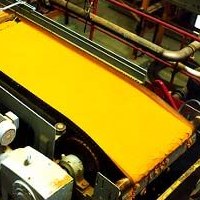
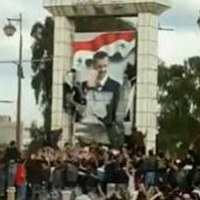
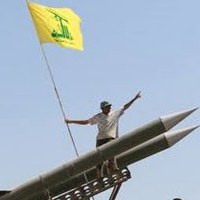

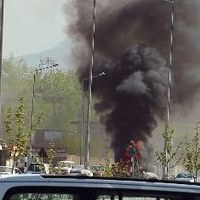




#WikiLeaks : Noord-Korea en #China Leverden Raketonderdelen Aan #Iran | #Israel #VS #VN http://j.mp/eF9OQ8
WikiLeaks: Noord-Korea en China Leverden Raketonderdelen Aan Iran …: (S/Rel China) Iran and North Kor… http://bit.ly/h50e1A #asematy
RT @CrethiPlethi: #WikiLeaks : Noord-Korea en #China Leverden Raketonderdelen Aan #Iran | #Israel #VS #VN http://j.mp/eF9OQ8
/via @CrethiPlethi Noord-Korea en China Leverden Raketonderdelen Aan Iran http://j.mp/eF9OQ8 http://ff.im/vhwcE // #reddawn #worm ?
RT @watchful1: /via @CrethiPlethi Noord-Korea en China Leverden Raketonderdelen Aan Iran http://j.mp/eF9OQ8 http://ff.im/vhwcE // #redda …
WikiLeaks: Noord-Korea en China Leverden Raketonderdelen Aan Iran …: –Indicate that the U.S. believes that the… http://bit.ly/dQT3BT